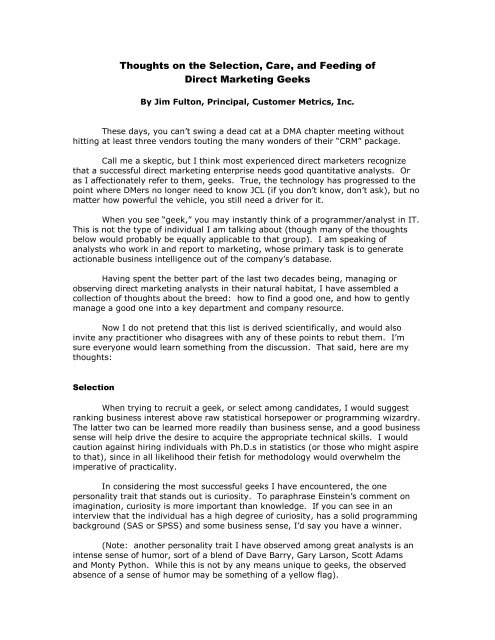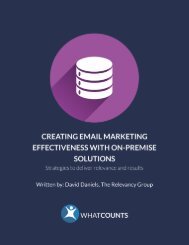Thoughts on the Selection Care and Feeding of Direct Marketing Geeks
thoughts on the selection, care and feeding of - WhatCounts
thoughts on the selection, care and feeding of - WhatCounts
- No tags were found...
Create successful ePaper yourself
Turn your PDF publications into a flip-book with our unique Google optimized e-Paper software.
<str<strong>on</strong>g>Thoughts</str<strong>on</strong>g> <strong>on</strong> <strong>the</strong> Selecti<strong>on</strong>, <strong>Care</strong>, <strong>and</strong> <strong>Feeding</strong> <strong>of</strong><br />
<strong>Direct</strong> <strong>Marketing</strong> <strong>Geeks</strong><br />
By Jim Fult<strong>on</strong>, Principal, Customer Metrics, Inc.<br />
These days, you can’t swing a dead cat at a DMA chapter meeting without<br />
hitting at least three vendors touting <strong>the</strong> many w<strong>on</strong>ders <strong>of</strong> <strong>the</strong>ir “CRM” package.<br />
Call me a skeptic, but I think most experienced direct marketers recognize<br />
that a successful direct marketing enterprise needs good quantitative analysts. Or<br />
as I affecti<strong>on</strong>ately refer to <strong>the</strong>m, geeks. True, <strong>the</strong> technology has progressed to <strong>the</strong><br />
point where DMers no l<strong>on</strong>ger need to know JCL (if you d<strong>on</strong>’t know, d<strong>on</strong>’t ask), but no<br />
matter how powerful <strong>the</strong> vehicle, you still need a driver for it.<br />
When you see “geek,” you may instantly think <strong>of</strong> a programmer/analyst in IT.<br />
This is not <strong>the</strong> type <strong>of</strong> individual I am talking about (though many <strong>of</strong> <strong>the</strong> thoughts<br />
below would probably be equally applicable to that group). I am speaking <strong>of</strong><br />
analysts who work in <strong>and</strong> report to marketing, whose primary task is to generate<br />
acti<strong>on</strong>able business intelligence out <strong>of</strong> <strong>the</strong> company’s database.<br />
Having spent <strong>the</strong> better part <strong>of</strong> <strong>the</strong> last two decades being, managing or<br />
observing direct marketing analysts in <strong>the</strong>ir natural habitat, I have assembled a<br />
collecti<strong>on</strong> <strong>of</strong> thoughts about <strong>the</strong> breed: how to find a good <strong>on</strong>e, <strong>and</strong> how to gently<br />
manage a good <strong>on</strong>e into a key department <strong>and</strong> company resource.<br />
Now I do not pretend that this list is derived scientifically, <strong>and</strong> would also<br />
invite any practiti<strong>on</strong>er who disagrees with any <strong>of</strong> <strong>the</strong>se points to rebut <strong>the</strong>m. I’m<br />
sure every<strong>on</strong>e would learn something from <strong>the</strong> discussi<strong>on</strong>. That said, here are my<br />
thoughts:<br />
Selecti<strong>on</strong><br />
When trying to recruit a geek, or select am<strong>on</strong>g c<strong>and</strong>idates, I would suggest<br />
ranking business interest above raw statistical horsepower or programming wizardry.<br />
The latter two can be learned more readily than business sense, <strong>and</strong> a good business<br />
sense will help drive <strong>the</strong> desire to acquire <strong>the</strong> appropriate technical skills. I would<br />
cauti<strong>on</strong> against hiring individuals with Ph.D.s in statistics (or those who might aspire<br />
to that), since in all likelihood <strong>the</strong>ir fetish for methodology would overwhelm <strong>the</strong><br />
imperative <strong>of</strong> practicality.<br />
In c<strong>on</strong>sidering <strong>the</strong> most successful geeks I have encountered, <strong>the</strong> <strong>on</strong>e<br />
pers<strong>on</strong>ality trait that st<strong>and</strong>s out is curiosity. To paraphrase Einstein’s comment <strong>on</strong><br />
imaginati<strong>on</strong>, curiosity is more important than knowledge. If you can see in an<br />
interview that <strong>the</strong> individual has a high degree <strong>of</strong> curiosity, has a solid programming<br />
background (SAS or SPSS) <strong>and</strong> some business sense, I’d say you have a winner.<br />
(Note: ano<strong>the</strong>r pers<strong>on</strong>ality trait I have observed am<strong>on</strong>g great analysts is an<br />
intense sense <strong>of</strong> humor, sort <strong>of</strong> a blend <strong>of</strong> Dave Barry, Gary Lars<strong>on</strong>, Scott Adams<br />
<strong>and</strong> M<strong>on</strong>ty Pyth<strong>on</strong>. While this is not by any means unique to geeks, <strong>the</strong> observed<br />
absence <strong>of</strong> a sense <strong>of</strong> humor may be something <strong>of</strong> a yellow flag).
The Cloister Questi<strong>on</strong><br />
Larger organizati<strong>on</strong>s with a multi-geek staff inevitably face a decisi<strong>on</strong> about<br />
whe<strong>the</strong>r or not to create an “analysis group” separate from a “direct marketing<br />
operati<strong>on</strong>s” or “direct marketing planning” functi<strong>on</strong>. I think <strong>the</strong>re are legitimate<br />
points <strong>on</strong> ei<strong>the</strong>r an integrated or a separated structure.<br />
Organizati<strong>on</strong>ally, it may be necessary to create different groups, with<br />
different titles. In this case, I think that it would be prudent to maintain physical<br />
integrati<strong>on</strong> with <strong>the</strong> rest <strong>of</strong> <strong>the</strong> direct marketing organizati<strong>on</strong>. First, you want geeks<br />
to apply <strong>the</strong>ir talents to practical business problems, <strong>and</strong> I have too <strong>of</strong>ten seen<br />
detached “analysis groups” drift <strong>of</strong>f into quasi-academic research with <strong>on</strong>ly a<br />
tangential relevance to real business questi<strong>on</strong>s.<br />
Sec<strong>on</strong>dly, managerially or physically integrating <strong>the</strong> geeks <strong>of</strong>fers <strong>the</strong> very real<br />
organizati<strong>on</strong>al benefit <strong>of</strong> teaching <strong>and</strong> sharpening <strong>the</strong> planning <strong>and</strong> operati<strong>on</strong>s staffs,<br />
which ideally results in a more accomplished, more coherent <strong>and</strong> happier<br />
department. A “grunts vs. geeks” split is avoided.<br />
Finally, having worked with a number <strong>of</strong> smaller companies where a dedicated<br />
analysis group is not possible due to <strong>the</strong> scale <strong>of</strong> <strong>the</strong> business, I have observed that<br />
<strong>the</strong> geeks (more <strong>of</strong>ten, geek) in that envir<strong>on</strong>ment seem much happier, motivated<br />
<strong>and</strong> focused than <strong>the</strong>ir counterparts operating in a detached group.<br />
The Importance Of Playtime<br />
While I believe geeks need to stay attached to real business questi<strong>on</strong>s <strong>and</strong><br />
issues, it is equally true that <strong>the</strong>y need “playtime” in <strong>the</strong> database. This is<br />
particularly true if you have successfully found a geek with a high degree <strong>of</strong><br />
curiosity.<br />
“Playtime” is project work or research that <strong>the</strong> geek has developed a pers<strong>on</strong>al<br />
interest in, <strong>and</strong>/or is not immediately related to <strong>the</strong> “label licking” functi<strong>on</strong>s <strong>of</strong> a<br />
direct marketing department. It may be related to a department functi<strong>on</strong> (for<br />
example, how do customers acquired from different classes <strong>of</strong> list rentals perform<br />
during <strong>the</strong>ir first twelve m<strong>on</strong>ths <strong>on</strong> <strong>the</strong> file), or it may be something largely unrelated<br />
to direct marketing (how do <strong>the</strong> merch<strong>and</strong>ise selecti<strong>on</strong>s made by l<strong>on</strong>g-term<br />
customers differ from <strong>the</strong> selecti<strong>on</strong>s made by new customers?)<br />
Because <strong>the</strong>y have such vast data access, <strong>and</strong> <strong>the</strong> ability to appropriately<br />
organize <strong>and</strong> analyze that data, <strong>the</strong>ir range <strong>of</strong> curiosities is virtually limitless.<br />
As l<strong>on</strong>g as <strong>the</strong> curiosity has some business applicati<strong>on</strong> (even if it isn’t<br />
necessarily in this year’s departmental objectives), I would str<strong>on</strong>gly recommend<br />
giving <strong>the</strong>m a fairly l<strong>on</strong>g leash, as l<strong>on</strong>g as <strong>the</strong> project doesn’t degrade from<br />
accomplishing <strong>the</strong> essentials <strong>of</strong> <strong>the</strong> business. Curiosity will drive <strong>the</strong> individual to<br />
learn new programming techniques, or it may enable some exposure to or<br />
involvement in areas <strong>of</strong> <strong>the</strong> company outside <strong>the</strong> departmental blinders. These are<br />
all, as Martha Stewart would say, “good things.”
D<strong>on</strong>’t Let Ad Hoc Run Amok<br />
<strong>Direct</strong> marketing managers inevitably use <strong>the</strong>ir geeks for a variety <strong>of</strong> ad hoc<br />
analyses – a questi<strong>on</strong> comes up in an executive meeting, <strong>and</strong> <strong>the</strong> quickest way to<br />
answer it is to ask a geek.<br />
D<strong>on</strong>e properly, <strong>the</strong>se ad hoc questi<strong>on</strong>s can be useful <strong>and</strong> interesting;<br />
pers<strong>on</strong>ally, I always enjoyed ad hoc questi<strong>on</strong>s because:<br />
a) It gave me something new to do<br />
b) It exposed me to some<strong>on</strong>e else’s curiosity (which can, incidentally, provide<br />
invaluable insight into how that some<strong>on</strong>e else thinks) <strong>and</strong><br />
c) It was usually a fairly quick effort, with immediate thanks <strong>and</strong> feedback.<br />
For less experienced geeks, ad hoc questi<strong>on</strong>s are also a good training tool –<br />
<strong>the</strong> questi<strong>on</strong> being asked is usually (though not always) fairly specific, so <strong>the</strong> task is<br />
to translate that questi<strong>on</strong> into SPSS or SAS code, <strong>and</strong> generate an answer.<br />
There is, however, something <strong>of</strong> a slippery slope <strong>on</strong> ad hoc queries: be<br />
careful that you’re not leaning <strong>on</strong> a fairly expensive (<strong>and</strong> easily-bored) geek to do<br />
routine, repetitive reporting that would be more ec<strong>on</strong>omically generated by your<br />
company’s IT group. A former colleague, probably <strong>the</strong> most gifted geek I have ever<br />
worked with, spent a c<strong>on</strong>siderable amount <strong>of</strong> time generating regular reports <strong>on</strong><br />
what percentage <strong>of</strong> orders are paid for in cash vs. check vs. credit card.<br />
Good informati<strong>on</strong> to know? Certainly. But in this case, <strong>the</strong> geeks were being<br />
used as a patch because <strong>the</strong> company’s internal systems were not designed to<br />
generate this informati<strong>on</strong>. These kinds <strong>of</strong> tasks – asked weekly or m<strong>on</strong>thly or<br />
quarterly – can leave a geek feeling extremely frustrated <strong>and</strong> underutilized. Which<br />
can <strong>the</strong>n result in <strong>the</strong> geek leaving.<br />
Mentor<br />
I cannot overemphasize <strong>the</strong> value <strong>of</strong> a good mentor. This can be <strong>the</strong> geek’s<br />
immediate manager, but is more <strong>of</strong>ten a more senior executive (not necessarily <strong>on</strong>e<br />
with resp<strong>on</strong>sibility for direct marketing), an experienced colleague or an outside<br />
c<strong>on</strong>sultant. I d<strong>on</strong>’t think “assigned mentors” are particularly realistic, since <strong>the</strong> right<br />
interpers<strong>on</strong>al chemistry is essential if <strong>the</strong> relati<strong>on</strong>ship is going to work. But make an<br />
effort to expose your geek to a variety <strong>of</strong> people who might make good mentors, <strong>and</strong><br />
if <strong>and</strong> when <strong>the</strong> geek <strong>and</strong> <strong>the</strong> would-be mentor hit it <strong>of</strong>f, make sure you help enable<br />
<strong>the</strong> relati<strong>on</strong>ship.<br />
A mentor can teach <strong>the</strong> geek a variety <strong>of</strong> things: <strong>the</strong> interrelati<strong>on</strong>ship<br />
between corporate strategic issues <strong>and</strong> <strong>the</strong> work <strong>the</strong> geek does; <strong>the</strong> importance not<br />
<strong>on</strong>ly <strong>of</strong> technical ability, but <strong>the</strong> ability to communicate ideas <strong>and</strong> analyses to n<strong>on</strong>technical<br />
audiences.<br />
A mentor can also challenge, <strong>and</strong> thus teach, <strong>the</strong> geek in a way that is<br />
<strong>of</strong>tentimes awkward for <strong>the</strong> geek’s manager – <strong>the</strong> mentor, after all, isn’t going to be<br />
giving a performance appraisal, <strong>and</strong> <strong>the</strong> challenge is thus seen in <strong>the</strong> c<strong>on</strong>text <strong>of</strong><br />
educati<strong>on</strong>, not in <strong>the</strong> c<strong>on</strong>text <strong>of</strong> a reprim<strong>and</strong> or dissatisfacti<strong>on</strong>.
Be Prepared to Teach<br />
Every<strong>on</strong>e’s time is under pressure: days <strong>and</strong> weeks fly by, <strong>and</strong> emails <strong>and</strong><br />
voicemails dem<strong>and</strong> c<strong>on</strong>stant attenti<strong>on</strong>. I would suggest that <strong>on</strong>e <strong>of</strong> <strong>the</strong> key<br />
resp<strong>on</strong>sibilities <strong>of</strong> a manager is to teach your employees, <strong>and</strong> this is especially true<br />
with geeks. With luck, you’ve recruited some<strong>on</strong>e with an above-average degree <strong>of</strong><br />
curiosity. Moreover, I think it is essential that <strong>the</strong>y underst<strong>and</strong> not <strong>on</strong>ly <strong>the</strong> c<strong>on</strong>text<br />
<strong>of</strong> <strong>the</strong> work <strong>the</strong>y’re doing, but also what o<strong>the</strong>r issues are percolating around <strong>the</strong>m.<br />
For example, if you’re getting pressure from senior management to explain<br />
changes in your customer acquisiti<strong>on</strong> ec<strong>on</strong>omics, take an hour or two <strong>on</strong> a Friday<br />
afterno<strong>on</strong> to kick around ideas with your geek(s). Walk through <strong>the</strong> cost-per-newcustomer<br />
equati<strong>on</strong>, how <strong>the</strong> various comp<strong>on</strong>ents have been changing, why <strong>the</strong>y’ve<br />
been changing. For <strong>on</strong>e thing, <strong>the</strong> exercise might help clarify things in your mind.<br />
And <strong>the</strong> geek will at <strong>the</strong> very least learn something, <strong>and</strong> could potentially identify<br />
areas where he or she might be able to help you analyze some <strong>of</strong> <strong>the</strong>se issues.<br />
Be Prepared to Learn<br />
If you’ve hired a good geek <strong>and</strong> given <strong>the</strong>m a good envir<strong>on</strong>ment, <strong>the</strong>y will<br />
almost unavoidably start to discover things. Some <strong>of</strong> <strong>the</strong>m might be fairly narrowly<br />
tactical <strong>and</strong> intuitively obvious (“Did you realize that we d<strong>on</strong>’t successfully prospect<br />
with parkas in Texas?”). O<strong>the</strong>rs might be quite significant strategically (“Um, <strong>the</strong><br />
<strong>on</strong>ly way you can rati<strong>on</strong>alize our current customer acquisiti<strong>on</strong> investment is if your<br />
lifetime value model assumes all <strong>of</strong> our customers live for four hundred years”). In<br />
ei<strong>the</strong>r case, you should be prepared to learn what <strong>the</strong> geek is trying to teach.<br />
There’s an old saying that <strong>the</strong> <strong>on</strong>ly thing harder than getting a new idea into<br />
some people’s minds is getting an old idea out. If <strong>and</strong> when your geek starts coming<br />
up with analyses or approaches that shake <strong>the</strong> c<strong>on</strong>venti<strong>on</strong>al wisdom, be prepared for<br />
<strong>the</strong> possibility that <strong>the</strong> c<strong>on</strong>venti<strong>on</strong>al wisdom might be wr<strong>on</strong>g.<br />
H<strong>on</strong>esty/Integrity<br />
I never really c<strong>on</strong>sidered this an issue, but après-Enr<strong>on</strong>, it unfortunately<br />
merits menti<strong>on</strong>. In hiring <strong>and</strong> managing a geek, <strong>the</strong> importance <strong>of</strong> h<strong>on</strong>esty <strong>and</strong><br />
integrity should be paramount. H<strong>on</strong>est mistakes are OK; making up analyses,<br />
because you realize <strong>the</strong> practical impossibility <strong>of</strong> any<strong>on</strong>e else auditing <strong>the</strong> analysis, is<br />
obviously not.<br />
So those are my thoughts – I hope you have found <strong>the</strong>m entertaining, if not<br />
enlightening. Comments or questi<strong>on</strong>s are welcome – jbfult<strong>on</strong>@aol.com.<br />
Jim Fult<strong>on</strong> started his direct marketing career at L<strong>and</strong>s’ End during <strong>the</strong> Reagan<br />
Administrati<strong>on</strong>. He left L<strong>and</strong>s’ End in 1999 when he realized his diet didn’t have<br />
enough airline food. The founder <strong>and</strong> principal <strong>of</strong> Customer Metrics, Inc., a database<br />
marketing, analysis <strong>and</strong> strategy c<strong>on</strong>sultancy, Jim visits Seattle frequently <strong>on</strong><br />
business; he lives in Madis<strong>on</strong>, Wisc<strong>on</strong>sin.







